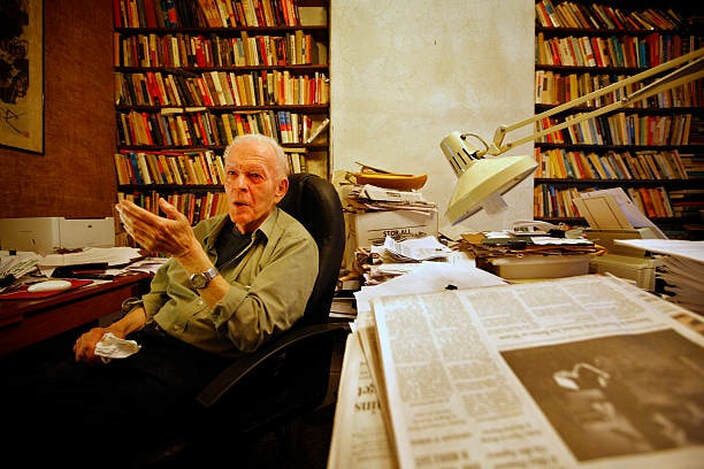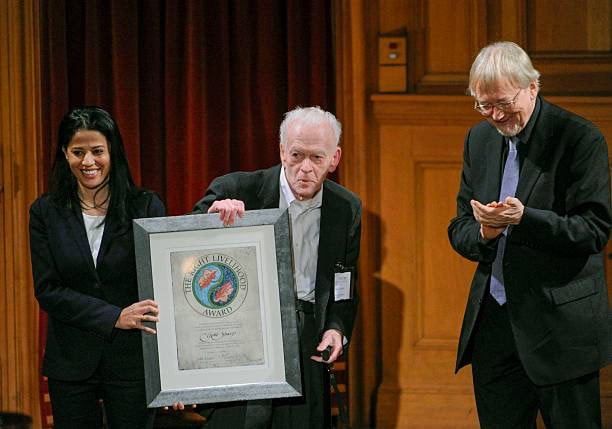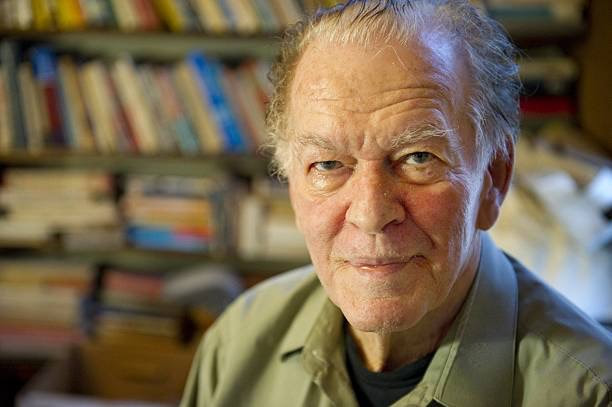The White Rose Society honors Gene Sharp and Jamila Raqib, the Founders of the Albert Einstein Institute for nonviolent activism. Although Gene passed away peacefully in Boston, Massachusetts on January 28, 2018, he continues to inspire revolutionaries all over the world, and even the progressive organizers of the west. Today refrains like “Medicare for All,” and “We are the 99%,” are as normalized as discussions about the weather but for scholar and nonviolent activist Gene Sharp, these sentiments of equality through democracy and civilian power formed the foundation of his writing and civil work. You may not have heard of Gene Sharp. Principally he was a writer, an observer and documenter of skills to build nonviolent movements and propagated his work in books and writings, many of which are available for free on the Albert Einstein Institute’s website which he founded. His scholarship acknowledges the need for defense from those who would restrict our rights or cause us harm but highlights the moral obligation to fight back nonviolently. He reminds individuals of the Role of Power in Nonviolent Struggles provides would-be revolutionaries with 198 Methods of Nonviolent Protest for Civilian-Based Defense from tyrannical leaders who seek to deprive people of their rights. Sharp’s true legacy, however, rests in the influence of his teachings on the real struggle against tyranny. His work is credited to be the foundation for the Arab Spring uprising and the overthrow of Slobodan Milošević, the former pro-Serbian, nationalist dictator of Yugoslavia. When asked about this influence, he declines any credit or paternalist influence saying to the New York Times in 2012: “I don’t talk about what needs changing or where. It’s up to the people themselves who decide to change.” Reclaiming power in an environment of fear It’s a common misconception of each new generation that the present represents the most dangerous, or the least free period in history. Sharp, born at the start of the Great Depression, witnessed the rise of fascism, nuclear annihilation associated with the Second World War, and lived under the threat of the Cold War for much of his youth. Sharp refused to be cowed by fear of hostile governments. Instead, he focused on their role as power brokers in a global society and those individuals who successfully wrest power away from the elite. Some of those people, Gandhi, and Martin Luther King, Jr. were loci of how power can shift non-violently and informed Sharp’s case studies of nonviolent revolutions. He never sought to begin the revolution instead, he said, “I’m trying to examine how nonviolent struggle has been operated. And sometimes it fails for a while, sometimes it succeeds. But how can you wage nonviolent struggle more skillfully while using your mind to plan?” And the Oscar for peaceable regime change goes to... Gene Sharp! Arab Spring leaders utilized Sharp’s book From Dictatorship to Democracy, which was written at the request of dissidents in Burma and originally published there. It is a guidebook for revolutionaries to understand how to organize and create their own power. Today, it is published in 31 languages. This same book also influenced Otpor! the main group opposing Miloseviç during the Serbian uprising. These revolutionaries were even trained by Sharp at the Albert Einstein Institute. What differentiates Sharp from his contemporaries and other civil disobedience actors was his adherence to post-colonial, or anti-paternalistic, international relations theory. What else can we learn from Gene Sharp? Throughout the 20th century, regime change was principally led by western governments seeking to impose democracy or depose dictators. In these instances, elites are the nexus of power in the hope that new, western-aligned, elites can bring democracy and human rights to nations that had previously been subjugated. For Sharp, protests, revolutions, and regime change are principally methods to reorganize the power structure and remind elites that without the support of the people, their regimes might cease to exist in an instant. Post-colonialism is principally how victims of paternalism reclaim their power and nations from colonizers. Today, in one of the most unequal periods in history, progressives across the west, like their Middle Eastern, Southeast Asian, and Eastern European counterparts before them, are organizing, following the principles of 198 Methods. “When power is effectively effused throughout the society among strong loci,” where loci is defined as civil society groups who hold sway over social and political happenings, “the rulers’ power is most likely subjected to controls and limits, thus enabling the society to resist oppression, usurpation, and aggression. This condition is associated with political freedom.” For modern progressive activists, Sharp’s work is more significant than ever before. Across the west, elites have consolidated power at the expense of the many. We are beginning to see the majority organize against tyrannical power. “People continue,” he said to the NYTimes, “because it works. When you start withdrawing your cooperation, the regime won’t like it. They will instill fear, but if you are not afraid, then the reason for fear does not exist.” Comments are closed.
|
AuthorPeacemaker Magazine is a White Rose Society publication. Archives
April 2019
Categories
All
|



 RSS Feed
RSS Feed
